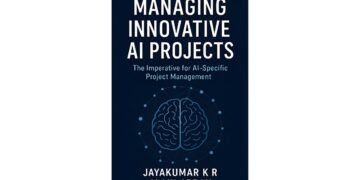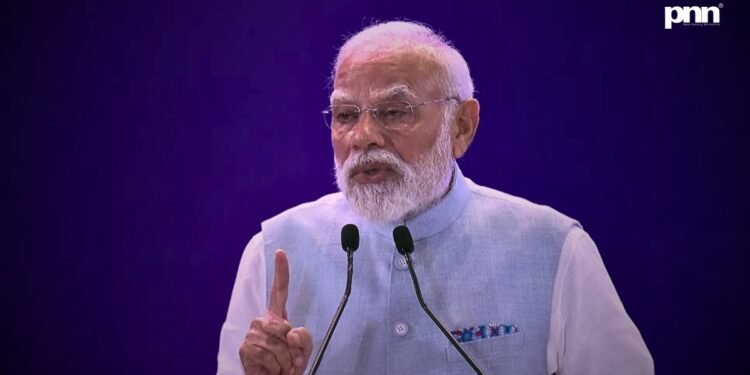New Delhi [India], November 3: At Bharat Mandapam, where ideas usually echo politely, Prime Minister Narendra Modi set the stage ablaze. A ₹1 lakh crore Research, Development and Innovation Scheme was launched – not as a slogan, but as a statement: India’s tech game is about to get very real.
When Science Meets Scale
PM Modi’s address at the Emerging Science, Technology and Innovation Conclave 2025 wasn’t just another policy sermon. It was a masterclass in confidence. “When science meets scale, when innovation becomes inclusive, when technology drives transformation – the foundation for great achievements is laid,” he said. And for once, that didn’t sound like a cliché.
The Prime Minister made it clear that India’s innovation narrative has outgrown its old costume. The nation isn’t just a tech consumer anymore – it’s becoming a global pioneer of transformation through technology.
He was right. The numbers back him. India’s R&D spending has doubled in the last decade, patent filings have multiplied seventeen-fold, and the country now boasts the world’s third-largest startup ecosystem. Over 6,000 deep-tech startups are working on next-gen materials, clean energy, semiconductors, and biomanufacturing.
That’s not optimism. That’s data.
Ease of Doing Research
PM Modi introduced a phrase that might just become policy folklore: “Ease of Doing Research.” It’s a clever pivot from the much-touted “Ease of Doing Business.” The idea is simple – make innovation frictionless.
Reforms in procurement, financial rules, and regulatory processes are designed to help prototypes leap from lab benches to market shelves faster than ever before. The ₹1 lakh crore RDI fund – announced with his trademark flair – puts serious money where the mouth is. For the first time, India’s researchers and private innovators have access to capital for high-risk, high-reward projects.
That’s venture energy at a national scale.
The Confidence of a Nation That Builds Its Own Satellites
PM Modi’s timing was no accident. Just a day before his speech, Indian scientists launched the nation’s heaviest communication satellite – another feather in ISRO’s already crowded cap. The Prime Minister used the moment to underline India’s momentum: “Yesterday we scaled new heights in science and technology, and today we lay the foundation for even greater transformation.”
The message: India is done playing catch-up.
And he wasn’t just speaking to scientists. He was speaking to every startup founder, engineer, and dreamer watching India’s scientific renaissance unfold.
Digital Public Infrastructure: The Unseen Engine
One of the Prime Minister’s proudest refrains returned: India’s Digital Public Infrastructure. “Today, India has the world’s most successful digital public infrastructure,” he said.
He’s not exaggerating. Two lakh gram panchayats are fiber-connected. UPI has rewritten the global digital payments playbook. Data is cheap, access is widespread, and the digital divide is shrinking faster than skeptics predicted.
When the world scrambled for vaccination logistics, India delivered the world’s largest vaccination programme with its homegrown tech stack. That’s what happens when scale meets science.
Women: From Innovators to Icons
One of the most satisfying parts of PM Modi’s speech was about women. A decade ago, fewer than 100 patents a year were filed by women in India. Today, that number is over 5,000. And women now make up 43% of STEM enrolments – higher than the global average.
That’s not tokenism. That’s transformation.
“When innovation is inclusive, its primary beneficiaries become its leaders,” PM Modi said, acknowledging how women have gone from being contributors to commanding roles in India’s scientific story.
AI: From Buzzword to Framework
Artificial Intelligence got the kind of mention that usually makes techies sit up straight. PM Modi declared that India is shaping the global framework for ethical and human-centric AI, and announced the upcoming Global AI Summit in February 2026.
With the India AI Mission investing over ₹10,000 crore, the country isn’t just experimenting – it’s engineering the rules of responsible AI before the world decides them for us.
That’s smart. That’s sovereign digital leadership.
Science for the Next Billion
PM Modi’s brand of tech optimism always circles back to inclusion. His challenge this time: shift from food security to nutrition security, from import dependence to innovation independence.
He threw a few curveballs to the scientific community:
- Can India develop biofortified crops that end global malnutrition?
- Can clean, affordable soil enhancers replace chemical fertilizers?
- Can genomic diversity mapping make personalized medicine mainstream?
These weren’t rhetorical flourishes. They were marching orders.
And the message was clear – India’s science must not just chase patents; it must solve problems that matter to the next billion.
From Labs to Legends
Behind the grand announcements lies a clear pattern. PM Modi’s government has seeded an innovation infrastructure that’s no longer aspirational – it’s operational.
Nearly 10,000 Atal Tinkering Labs are now nurturing over one crore young experimenters across India. That number will soon rise to 25,000 labs. Universities are multiplying, IITs and IIITs are expanding, and the new education policy is breaking language barriers in STEM.
Add to that 10,000 new Prime Minister’s Research Fellowships over the next five years, and you’ve got a full-spectrum ecosystem – from school labs to high-risk research funding – aligned with one vision: make India the world’s innovation lab.
A Global Vision, an Indian Engine
India is rapidly building a vibrant ecosystem for research and development. Addressing the Emerging Science, Technology and Innovation Conclave in New Delhi. https://t.co/jIhdvjraIy
— Narendra Modi (@narendramodi) November 3, 2025
PM Modi’s speech wasn’t about bragging rights. It was a strategic narrative – India as a hub where science meets inclusion, technology drives transformation, and research is both national mission and private enterprise.
The ₹1 lakh crore RDI Scheme is not just a fund. It’s a psychological marker. It tells every Indian innovator that the country is finally ready to bet big on their ideas.
And if the world’s listening – it should.
Because this is not the India of jugaad anymore. This is the India of design, data, and deep-tech discipline.
Jai Vigyan. Jai Anusandhan. And, let’s be honest – Jai Execution!































